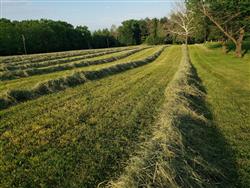Indiana Forage Council Hosts Inaugural Hoosier Hay Contest

The Indiana Forage Council (IFC), with assistance from Purdue Extension and SureTech Laboratories, is hosting a contest for Indiana producers who harvest forage for hay or baleage within the state for the 2021 hay season. Objectives of the Hoosier Hay Contest are to promote forage production, inform hay producers on the nutritive value of their hay and encourage producers to sample and test their hay or baleage before feeding it to livestock. It also creates a friendly competition amongst Indiana producers on who produces higher quality hay.
All samples will be analyzed by SureTech Laboratories in Indianapolis, Ind. and released only to the contest organizer, producer and producer’s local Purdue Extension agriculture and natural resources educator. The Hoosier Hay contest has two categories, hay or baleage. Prize money will go to first, second and third place entries in both categories. First place will receive $250 and a one-year membership to IFC; second place $150; and third place $100.
Winners will be recognized at the annual IFC meeting and the IFC website. The cost to participate is $15 per sample with the contest being limited to 100 samples. Rules and entry forms can be found at https://indianaforage.org/. For more information, contact Nick Minton at 812-279-4330 or nminton@purdue.edu and Jason Tower at 812-678-4427 or towerj@purdue.edu.
Keep an Eye on Garden & Landscape during Dry Periods
Many areas of the county missed out on needed rain last week, and with summer temperatures setting in, gardens and landscape plants may need some supplemental water in the coming weeks. Most garden plants will need 1-1.5” of water per week to maintain healthy leaves, flowers and fruit. When watering it is best to do a one or two thorough deep application versus several light sprinkles throughout the week. Frequent, shallow watering only moistens the upper layer of soil, which encourages plant roots to stay shallow. The top layer is also the first part of the soil profile to dry out, making these shallow-rooted plants more susceptible to stress. This also holds true for lawns and landscape plants. Newly set plants will likely need to be watered more frequently until deep, healthy roots are established.
For more timely articles on gardening and horticulture, I would highly recommend visiting Purdue’s Consumer Horticulture website available here: https://www.purdue.edu/hla/sites/yardandgarden/

